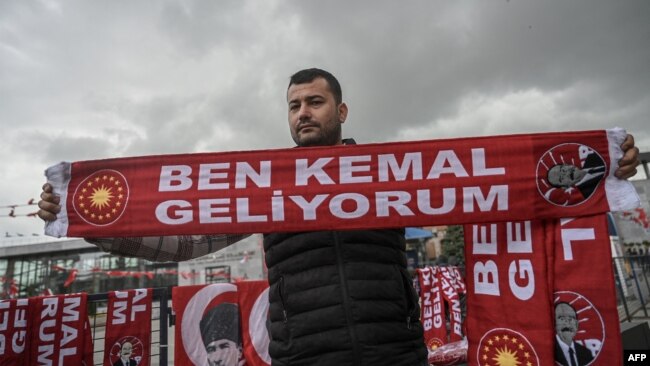With Turkey and Hungary continuing to block Sweden’s application to join the NATO military alliance, the Swedish government hopes for a swift ratification soon by both countries after Turkish elections scheduled for May 14.
Sweden and Finland lodged a joint application to join NATO just weeks after Russia’s invasion of Ukraine in February 2022.
The alliance welcomed Finland earlier this month – NATO’s 31st member state – after Turkish and Hungarian lawmakers finally voted through the ratification in March. Sweden’s application has yet to be approved by the same two NATO members.
Anti-terror law
Ankara has accused Sweden of harboring what it considers pro-Kurdish terrorists, including members of the PKK militant group, which Sweden denies.
Sweden’s prime minister, Ulf Kristersson, said he hoped next month’s presidential elections in Turkey could mark a turning point.
“Now we’re waiting for the Turkish elections. I think everyone realizes that there is a substantial role in this, which is about Turkish domestic politics and that is fully understandable, that’s how it is in most countries,” Kristersson said at a press conference March 31.
Sweden is set to introduce a new anti-terrorism law, which it hopes will persuade Turkey to approve its NATO application. Speaking to reporters April 5, Turkey’s foreign minister, Mevlut Cavusoglu, gave a measured response. “Of course, they have taken some steps but they are not enough. We are expecting additional efforts in the coming period,” he said.
NATO’s secretary-general, Jens Stoltenberg, has said he hopes that Sweden’s application is ratified in time for the alliance’s annual summit, scheduled for July 11-12 in Lithuania.
Alper Coşkun, of the Carnegie Endowment for International Peace and the former director general for international security affairs at the Turkish Ministry of Foreign Affairs, told VOA Turkish approval of Sweden’s application is not guaranteed.
“It will depend more on whether in the aftermath of the elections – irrespective of who wins – the Turkish authorities will be able to say to themselves and to the public at large, that some of Turkey’s expectations from Sweden have been met in terms of the implementation of that very law,” he said.
“I do not believe that it is necessarily in Turkey’s interest after the election and post the implementation of that (anti-terror) law in Sweden, to prolong the matter. So I would assume that it is still a realistic expectation that Sweden will be able to join (NATO) by the summit in Vilnius.”

Election campaign
Foreign policy comes second to domestic concerns in Turkey’s election campaign – and that could benefit Sweden’s NATO application, Coşkun added.
“Especially now, in the aftermath of the earthquakes and the economic circumstances in Turkey, it has even decreased even more. In that sense, I don’t think as far as the public opinion is concerned, or as far as the interest of the political parties in Turkey is concerned, it’s a leading topic, that there is attention on it. And I think that alleviates the domestic political pressure on the issue, which should facilitate a solution post-election.”
Turkish opposition parties have rallied behind a single candidate, Kemal Kılıçdaroğlu, in an effort to unseat incumbent President Recep Tayyip Erdogan. Coşkun believes an opposition win could benefit Sweden. “They’ve made it clear that they will underline Turkey’s place within NATO, within the Western security architecture,” he said.
Hungary
Meanwhile, Hungarian lawmakers say they are blocking Sweden’s NATO bid over its recent criticism of their country’s democratic credentials, part of a long-running dispute over the rule of law between Budapest and its European allies.
Analysts say that Turkey’s approval of Sweden’s bid would likely pressure Hungary to do the same, citing Budapest’s approval of Finland’s NATO application, which came just days after Ankara had signaled it would ratify Helsinki’s bid to join the alliance.
Hungary’s foreign minister, Péter Szijjártó, told the Associated Press March 25 that his country deserves more respect. “When Finnish and Swedish politicians question the democratic nature of our political system, that’s really unacceptable… As we give respect to all countries, we expect respect as well. And this respect was not really given,” he said.
Szijjártó did not elaborate on whether Hungary would approve Sweden’s NATO application, if Turkey were to do so after the May 14 election.
Source: VOA News


